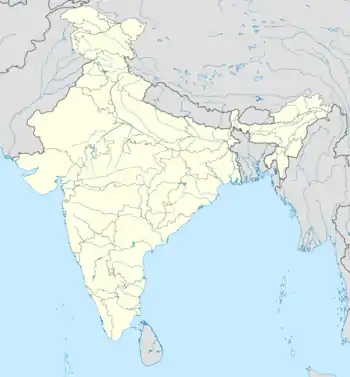Belebathan
Belebathan is a census town in the Raniganj CD block in the Asansol Sadar subdivision of the Paschim Bardhaman district in the state of West Bengal, India.
Belebathan | |
|---|---|
Census Town | |
 Belebathan Location in West Bengal, India  Belebathan Belebathan (India) | |
| Coordinates: 23.638715°N 87.064426°E | |
| Country | |
| State | West Bengal |
| District | Paschim Bardhaman |
| Area | |
| • Total | 2.95 km2 (1.14 sq mi) |
| Population (2011) | |
| • Total | 4,459 |
| • Density | 1,500/km2 (3,900/sq mi) |
| Languages* | |
| • Official | Bengali, Hindi, English |
| Time zone | UTC+5:30 (IST) |
| PIN | 713323 |
| Telephone code | 0341 |
| Vehicle registration | WB |
| Website | paschimbardhaman |
Geography
| Cities and towns in the eastern portion of Asansol Sadar subdivision in Paschim Bardhaman district MC: Municipal Corporation, CT: census town, N: neighbourhood, R: rural centre Owing to space constraints in the small map, the actual locations in a larger map may vary slightly |
Location
Belebathan is located at 23°38′19″N 87°03′52″E.
The Asansol-Durgapur area is composed of undulating laterite region. This area lies between two mighty rivers – the Damodar and the Ajay. They flow almost parallel to each other in the region – the average distance between the two rivers is around 30 km. For ages the area was heavily forested and infested with plunderers and marauders. The discovery of coal in the 18th century led to industrialisation of the area and most of the forests have been cleared.[1]
Jemari (J.K. Nagar Township), Belebathan, Murgathaul, Amkula, Egara, Sahebganj, Raghunathchak and Ballavpur form a cluster of census towns on the western and southern side of Raniganj. Banshra and Baktarnagar are adjacent to Raniganj on the eastern side.[2]
Urbanisation
According to the 2011 census, 83.33% of the population of Asansol Sadar subdivision was urban and 16.67% was rural.[3] In 2015, the municipal areas of Kulti, Raniganj and Jamuria were included within the jurisdiction of Asansol Municipal Corporation.[4] Asansol Sadar subdivision has 26 (+1 partly) Census Towns.(partly presented in the map alongside; all places marked on the map are linked in the full-screen map).
Demographics
According to the 2011 Census of India Belebathan had a total population of 4,459 of which 2,302 (52%) were males and 2,157 (48%) were females. Population in age mix 0–6 years was 594. The total number of literate persons in Belebathan was 2,792 (72.24% of the population over 6 years).[5]
*For language details see Raniganj (community development block)#Language and religion
As of 2001 India census,[6] Belebathan had a population of 4,292. Males constitute 53% of the population and females 47%. Belebathan has an average literacy rate of 54%, lower than the national average of 59.5%; 66% of the literates are males and 34% are females. 15% of the population is under 6 years of age.
Infrastructure
According to the District Census Handbook 2011, Bardhaman, Belebathan covered an area of 2.95 km2. Among the civic amenities, it had 8 km roads with open drains, the protected water-supply involved overhead tank, tube well, borewell, uncovered wells. It had 335 domestic electric connections. Among the medical facilities, it had 1 dispensary/ health centre, 5 medicine shops. Among the educational facilities it had were 2 primary schools, 1 middle school, the nearest senior secondary school at Jemari (J.K. Nagar Township) 1 km away. It had 2 non-formal education centres (Sarva Shiksha Abhiyan). An important commodity it produced was coal.[7]
Education
Belebathan has two primary schools.[8]
References
- Chattopadhyay, Akkori, Bardhaman Jelar Itihas O Lok Sanskriti (History and Folk lore of Bardhaman District.), (in Bengali), Vol I, pp 14-15, Radical Impression. ISBN 81-85459-36-3
- "Census of India 2011, West Bengal: District Census Handbook, Barddhaman" (PDF). Map of Raniganj CD Block, page 215. Directorate of Census Operations, West Bengal. Retrieved 31 August 2018.
- "District Statistical Handbook 2014 Burdwan". Table 2.2, 2.4(a). Department of Statistics and Programme Implementation, Government of West Bengal. Archived from the original on 21 January 2019. Retrieved 4 September 2018.
- "The Kolkata Gazette" (PDF). Notification No. 335/MA/O/C-4/1M-36/2014 dated 3 June 2015. Department of Municipal Affairs, Government of West Bengal. Archived from the original (PDF) on 12 March 2017. Retrieved 4 September 2018.
- "2011 Census – Primary Census Abstract Data Tables". West Bengal – District-wise. Registrar General and Census Commissioner, India. Retrieved 18 February 2017.
- "Census of India 2001: Data from the 2001 Census, including cities, villages and towns (Provisional)". Census Commission of India. Archived from the original on 16 June 2004. Retrieved 1 November 2008.
- "District Census Handbook Barddhaman, Census of India 2011, Series 20, Part XII A" (PDF). Section II Town Directory, Pages 1179-1210; Statement I: Status and Growth History, Page 1179; Statement II: Physical Aspects and Location of Towns, Page 1188; Statement III: Civic and other Amenities, Page 1191; Statement IV: Medical Facilities, Page 1196; Statement V: Educational, Recreational and Cultural Facilities, Page 1200; Statement VI:Industry and Banking, Page 1209. Directorate of census Operations V, West Bengal. Retrieved 14 May 2020.
- 7th All-India School Education Survey 2003 Archived 2007-09-27 at the Wayback Machine